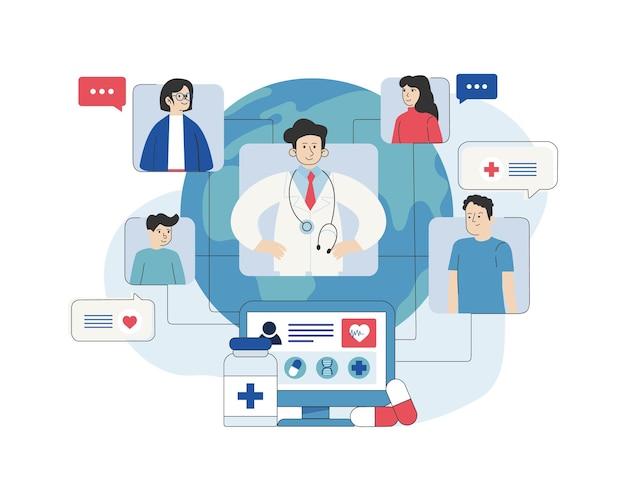-
Picture this: You’re at the doctor’s office, struggling to express what’s bothering you. The words just won’t come out right, and frustration mounts as the healthcare provider tries to understand your concerns. This scenario highlights a common problem in the field of health and social care – communication barriers.
-
Effective communication is essential in any healthcare setting, but it becomes even more critical when dealing with specialized areas like health and social care. Specialists in these fields require a unique set of communication skills to effectively convey information, understand patients’ needs, and provide appropriate care. But what exactly is specialist communication? And how can it overcome the language barrier that often hampers effective communication in healthcare?
-
In this blog post, we’ll dive into the world of specialist communication in health and social care. We’ll explore what it entails, the challenges posed by language barriers, and strategies to overcome them. Whether you are a healthcare professional or a patient seeking better understanding, this post will equip you with valuable insights into the importance of effective communication and how it can be achieved in specialized healthcare settings. So, let’s get started on our journey to break down the language barrier and improve communication in health and social care!

What is Specialist Communication in Health and Social Care
In the fast-paced world of health and social care, effective communication is essential for ensuring the well-being of patients and facilitating smooth interactions among healthcare professionals. But what exactly is specialist communication in this field? Let’s delve into this intriguing topic and uncover its significance.
The Art of Conveying Messages with Precision and Empathy
Specialist communication in health and social care is more than just exchanging information; it encompasses the art of conveying messages with precision, empathy, and cultural sensitivity. It involves tailoring communication techniques to meet the unique needs of diverse individuals, including patients, families, and fellow healthcare practitioners.
Empowering Patients with Knowledge
One key aspect of specialist communication is empowering patients with knowledge. Healthcare providers must be skilled in explaining complex medical conditions and treatment options in a way that is easily understandable to those without medical expertise. By doing so, they enable patients to make informed decisions about their own health and actively participate in their care.
Breaking Down Barriers with Active Listening
Active listening is another crucial component of specialist communication. By truly paying attention to what patients and colleagues are saying, healthcare professionals can build trust, foster collaboration, and address any concerns or misunderstandings promptly. This skill requires genuine engagement, putting aside distractions, and showing empathy to create a supportive and inclusive environment.
Adapting Communication Styles to Diverse Needs
Flexibility in communication style is essential in health and social care. Every individual is unique, and thus, their preferences for receiving information may vary. Some might respond well to a compassionate and nurturing approach, while others may prefer a more direct and straightforward communication style. Specialist communicators are adept at assessing these preferences and adapting their communication techniques accordingly.
Enhancing Coordination and Collaboration
Specialist communication plays a pivotal role in enhancing coordination and collaboration among healthcare teams. By sharing information effectively, healthcare professionals can ensure seamless transitions between different care settings, facilitate the accurate transfer of patient data, and avoid potential misunderstandings that might compromise patient safety.
A Healthy Dose of Humor
Although health and social care often deal with serious matters, there’s certainly room for humor. A well-placed humorous remark or light-hearted banter can ease tension, build rapport, and create a more positive and enjoyable environment for all parties involved. Laughter truly is the best medicine!
Specialist communication in health and social care goes beyond the exchange of words. It requires empathy, cultural understanding, active listening, and the ability to adapt to different communication styles. By mastering these skills, healthcare professionals can empower patients, enhance collaboration, and provide the highest quality of care in a friendly and engaging manner. So, let’s strive to communicate with compassion, precision, and maybe a sprinkle of humor along the way!

FAQ: What is Specialist Communication in Health and Social Care
What is Specialist Communication
Specialist communication refers to the specific set of skills and techniques used in health and social care professions to effectively convey information and interact with patients, colleagues, and other stakeholders. It goes beyond basic communication and requires professionals to adapt their approach based on the unique needs and circumstances of each situation.
What are Some Examples of Communication Skills
Communication skills in health and social care include active listening, clear and concise verbal communication, empathy, non-verbal cues, and the ability to adapt communication methods based on the individual’s needs, such as using visual aids or using simpler language for those with limited understanding.
What is the Language Barrier of Communication
The language barrier occurs when people who speak different languages or have limited language proficiency struggle to effectively understand and convey information. In health and social care settings, language barriers can hinder communication between patients and healthcare providers, leading to potential misunderstandings or difficulties in providing adequate care.
What is Effective Communication in Healthcare
Effective communication in healthcare involves the clear and accurate exchange of information between healthcare professionals, patients, and other stakeholders. It includes active listening, effective questioning, using appropriate language and tone, and providing feedback to ensure that messages are understood.
What are the 3 Steps of Communication
The three primary steps of communication are:
- Sender: The individual or entity initiating the communication by conveying a message or information.
- Message: The information being transmitted, which can be verbal, written, or non-verbal.
- Receiver: The person or group receiving the message and interpreting its meaning.
What is Specialist Communication in Health and Social Care
Specialist communication in health and social care involves using specific techniques, skills, and approaches to effectively communicate with individuals who may have unique needs, such as those with physical or cognitive impairments, mental health challenges, or diverse cultural backgrounds. It aims to ensure that information is communicated clearly, understood, and acted upon appropriately.
What are the 5 Process of Communication
The five processes involved in communication are:
- Encoding: The sender converts their thoughts, ideas, or messages into a format that can be understood by the receiver.
- Transmission: The encoded message is transmitted through a chosen medium, such as speaking, writing, or using technology.
- Reception: The receiver receives the transmitted message.
- Decoding: The receiver interprets and assigns meaning to the message using their knowledge, experiences, and context.
- Feedback: The receiver provides a response or confirmation to the sender, indicating that the message was received and understood.
Why is Language Barrier a Problem
Language barriers can be problematic in health and social care as they hinder effective communication between healthcare professionals and patients. This can lead to misunderstandings, errors in treatment, delays in care, and reduced patient satisfaction. It is essential to overcome language barriers to ensure accurate and patient-centered care.
What are the Barriers to Effective Communication in Healthcare
Several barriers can hinder effective communication in healthcare, including:
- Language and Cultural Differences: Differences in language and cultural norms can impact effective communication and understanding.
- Limited Health Literacy: Patients with limited health literacy may struggle to understand medical terminology, treatment plans, or medication instructions.
- Technological Barriers: Lack of access or familiarity with communication technologies can hinder effective communication between healthcare providers and patients.
- Noise and Distractions: Busy healthcare environments and noisy surroundings can make it challenging to hear or concentrate during communication.
- Hierarchy and Power Dynamics: Hierarchical structures and power imbalances can inhibit open and honest communication between healthcare professionals and patients.
How can a Healthcare Worker Overcome a Language Barrier
Healthcare workers can overcome language barriers by implementing the following strategies:
- Professional Interpreters: Utilize trained interpreters who are proficient in both the healthcare professional’s language and the patient’s language to facilitate effective communication.
- Translator Services: Use translation services for written materials, such as brochures, patient information leaflets, or consent forms.
- Visual Aids: Utilize visual aids, such as pictures, diagrams, or videos, to enhance understanding when words alone may not be sufficient.
- Simplifying Language: Use clear and simple language, avoiding medical jargon or complex terminology, to ensure patients can understand instructions and information.
- Cultural Sensitivity: Be mindful of cultural nuances and differences, adapting communication styles to respect and accommodate diverse cultural backgrounds.
Why is Language Important in Healthcare
Language is crucial in healthcare as it serves as the primary means for communication between healthcare professionals and patients. Effective communication ensures accurate diagnosis, treatment understanding, informed decision-making, and overall improved healthcare outcomes.
What is Language Barrier in Healthcare
A language barrier in healthcare refers to the difficulties that arise when there is a lack of shared language between healthcare professionals and patients. It can hinder effective communication, impair patient understanding, and potentially impact the quality of care provided.
What are Examples of Effective Communication Strategies
Effective communication strategies in healthcare include:
- Active listening to patients’ concerns and needs.
- Using open-ended questions to encourage patients to express themselves fully.
- Providing clear instructions and explanations using plain language.
- Engaging in empathy and showing understanding towards patients’ emotions and experiences.
- Demonstrating non-verbal cues like maintaining eye contact and using appropriate body language.
- Encouraging patients to ask questions and clarifying doubts.
- Using visual aids, such as diagrams or charts, to enhance understanding.
- Utilizing interpreter services or language support when needed.
What are the 2 Main Types of Communication
The two main types of communication are verbal communication, which involves spoken or written words, and non-verbal communication, which includes gestures, facial expressions, body language, and tone of voice. Both forms are critical in ensuring effective and comprehensive communication.
What are the Three Main Obstacles to Effective Communication
The three main obstacles to effective communication are:
- Lack of Clarity: Unclear messages or instructions can lead to misinterpretation or confusion.
- Assumptions and Stereotypes: Preconceived notions or biased perspectives can hinder understanding and empathy.
- Poor Listening Skills: Inattentiveness or failure to actively listen can result in misunderstandings and missed opportunities for effective communication.
How Can You Avoid Communication Barriers
To avoid communication barriers, consider the following strategies:
- Be an active listener, giving your full attention and showing genuine interest.
- Use clear and concise language, avoiding jargon or technical terms.
-Be aware of your non-verbal cues and ensure they align with your intended message.
-Practice empathy and understanding when talking to others.
-Solicit feedback to ensure the message was understood correctly.
-Be open-minded and avoid assumptions or stereotypes.
-Take cultural differences into account, adapting your communication approach as needed.
-Seek clarification when unsure of the message’s meaning.
Remember, effective communication is an ongoing process that requires practice, patience, and a willingness to adapt to individual needs and circumstances. By prioritizing strong communication skills in healthcare, professionals can build stronger relationships with patients, foster trust, and deliver high-quality care.
